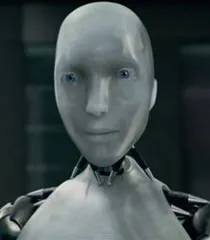Will Smart Machines Take Our Jobs?
Based on the lecture presented by Dr. Jay Richards.
https://video.okstate.edu/media/1_yewqu5cs
I, Robot
My sister is deathly afraid of robots, and the Will Smith movie I, Robot is to blame. The movie came out in 2004, meaning my sister would have been eight years old when she went with my parents to watch it. Even though my parents are pretty conservative in most of their values, they have never been the kind to not let us watch movies due to their “age-appropriateness”. The movie is a sci-fi thriller set in 2035, where robots have become a common part of everyday life. They are ordered to obey very strict laws to ensure they don't harm humans. Will Smith plays the main character, a detective named Del who is skeptical of robots and begins investigating the “suicide” of a leading robotics scientist at U.S. Robotics. Del suspects that a robot named Sonny, which appears to have violated the laws of robotics, may be involved in the scientist’s death. As he investigates, he uncovers a larger conspiracy that leads him to believe that technology is planning to take over the world. Like I said, my parents kind of let us watch whatever we wanted to growing up, especially if we were watching it with them, but when I tell you this movie TRAUMATIZED my sister, I mean it. She is a twenty-nine-year-old woman, and she is still terrified of robots to this day. We like to torment her with pictures of Sonny (the robot) in our family group chat at random times (to be fair, his face is creepy). On the other hand, my parents and I actually really enjoy this movie. This has to do with the idea that Dr. Richards mentioned, that this debate of the motives of technology has to do with the nature of the human person, not the technology. As soon as Dr. Richards opened with this statement, I knew I was going to agree with what he had to say. The argument of robots taking over the world had never had to do with the motives of the machines themselves; it has always been about the motives of other humans.
You Can Lead A Horse To Water, But You Can't Make It Drink
One of the hardest concepts in life for me to learn is that you can lead a horse to water, but you can't make it drink. And, unfortunately, this is the emphatic truth of human nature. You can show someone the difference between right and wrong, but you can never force them to become a good person. People have to make that choice for themselves. Your efforts won’t change who they are. This frustrates me to no end. A person’s values and actions are ultimately their responsibility. On top of this, the idea of a “good person” looks different to everyone. Everyone has different morals and beliefs. I think this is a common problem in laws and regulations. You can set every law and guidance as a preventive measure, but all it takes is one person with money and influence to completely deconstruct those laws. We will never be able to fully say that technological advancements will never pose a threat to human life because the true motive lies in the hands of those who wield that technology. Innovation, in itself, is neutral—it’s neither inherently good nor evil. The concern needs to shift from fearing the capabilities of machines to questioning the intentions of the people who program, fund, and control them.
Population Of Psychics
One of my favorite points that Dr. Richards made was that there is no set amount of work to be done in the world. What needs to be done is not the same today as it was yesterday. Dr. Richards said, “If you knew what work would need to get done in 20 years from now, you would be the next Bill Gates.” I love this concept because it challenges the fear that smart machines will leave us jobless as if there is an overall fixed amount of work. We can very quickly shut this idea down just by looking at how many jobs exist today that didn’t exist a decade ago. As technology advances, so do human needs. Machines might replace tasks, but they also create opportunities that we don’t even know of yet, as we are not psychic. Innovation is about adaptability, not scarcity. The conversation shouldn’t be about machines versus humans but rather how humans can work alongside machines to increase efficiency and innovation. Automation can free us from repetitive, mundane tasks and allow us to focus on creative problem-solving, emotional intelligence, and complex decision-making, all skills that machines can’t replicate.
Back To Creative Destruction
Creative destruction is a never-ending cycle. It is simply the process by which old ideas are replaced by newer, more efficient ones. Yes, it can feel unsettling, but it is also the way we develop. As Dr. Richards said, the industrial revolution destroyed the need for certain agricultural jobs, just like how the internet has reshaped things like shopping and consuming media. And yet, each of these moments has also created entirely new sectors of the economy, many of which would have been unimaginable to the generations that came before. The fear that machines will “take all the jobs” assumes that our current knowledge of work is final, when in reality, it's always changing.

